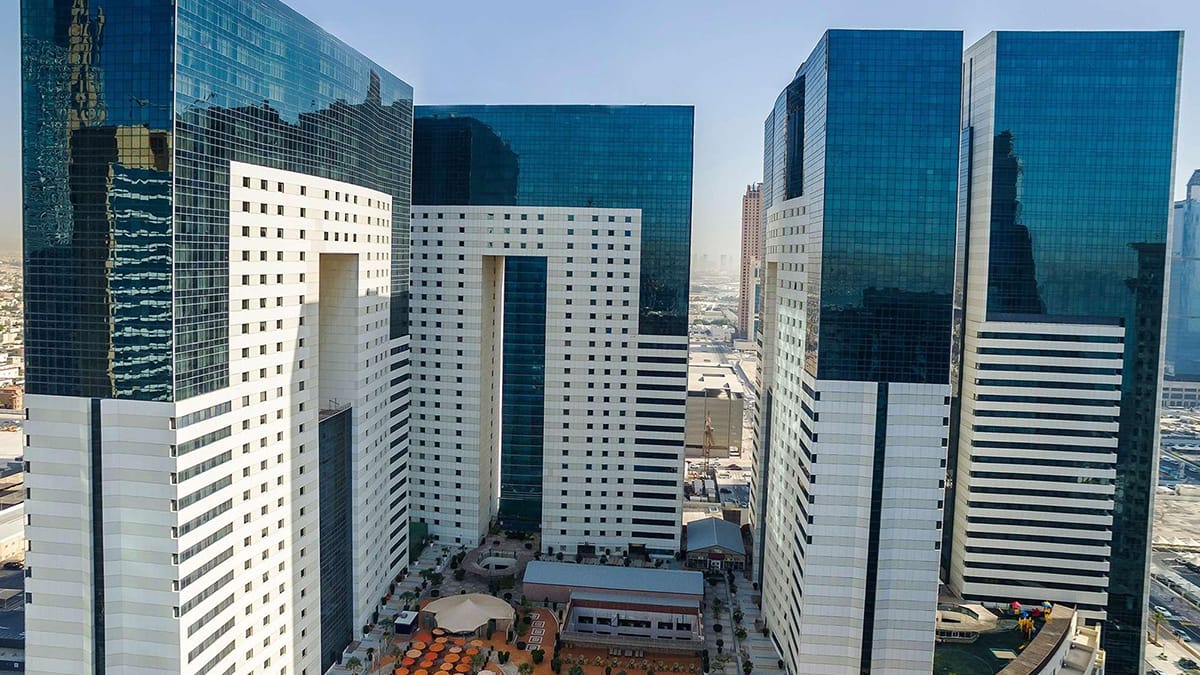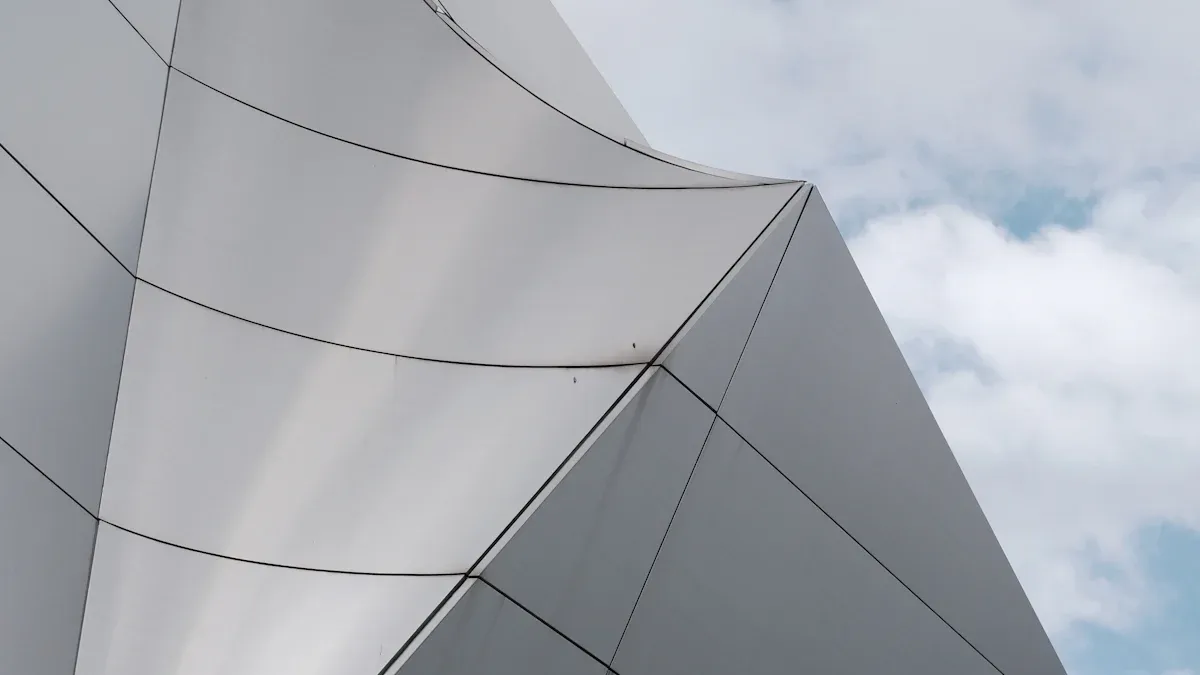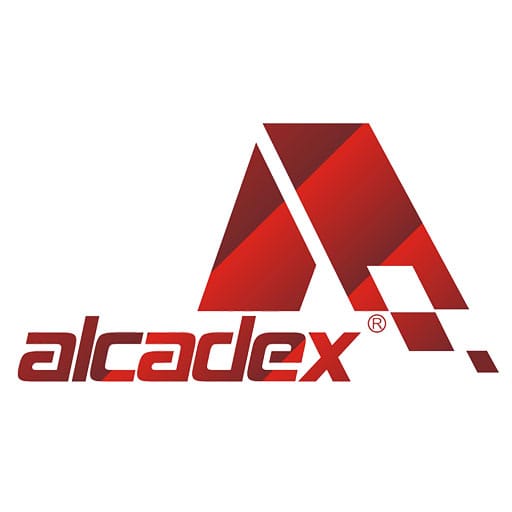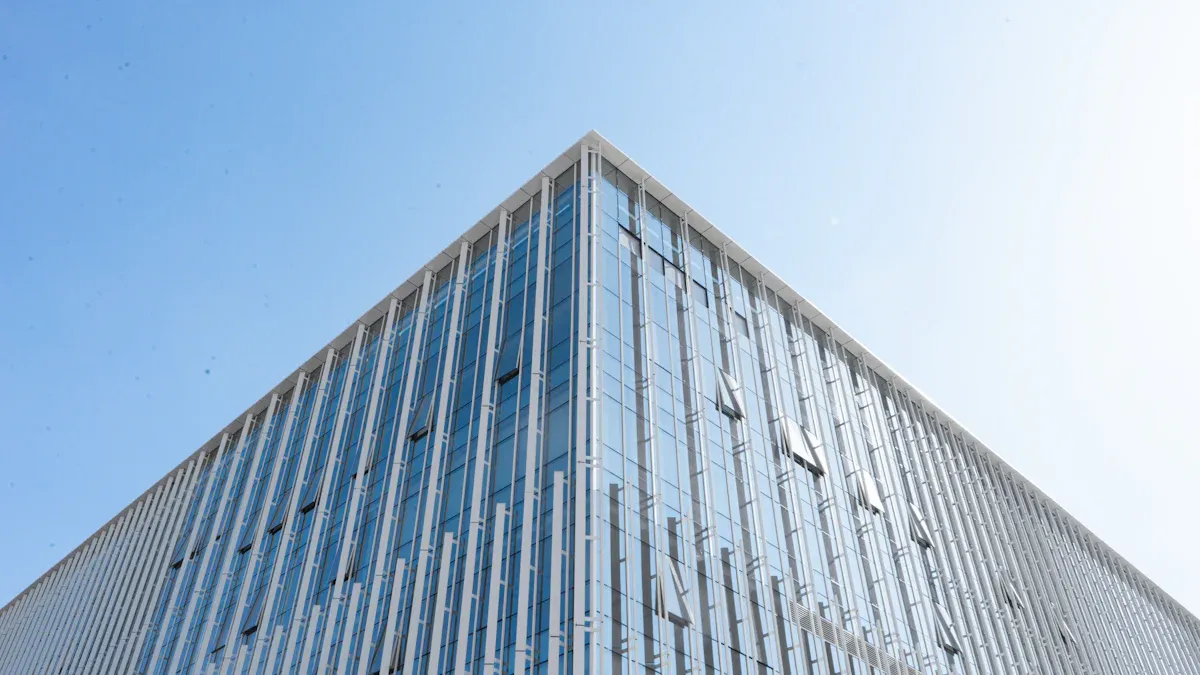
05 Sep Why Aluminium Composite Panels Are The Best Choice For Weather-Resistant Curtain Walls
Table of Contents
Aluminium composite panels are a top choice for weather-resistant curtain walls. Their aluminum layers and strong core make them very tough. They give long-lasting protection. ACP panel designs keep out water and stop air from leaking. This helps builders avoid problems like wet insulation and losing energy. Aluminium composite panels seal tightly, handle strong winds, and need less upkeep. Many architects pick aluminium composite panels and ACPs. They are strong, easy to clean, and keep their color in bad weather.
Aluminium composite panel systems use special coatings to fight UV rays and rust.
ACPs keep walls strong and looking good in hot or cold weather.
Key Takeaways
Aluminium composite panels give strong protection from bad weather. They help curtain walls stay safe from wind, rain, and sun.
ACPs cost less than many other materials. They save money over time because they last long and need little care.
Special coatings on ACPs block UV rays and stop rust. They keep colors bright for 20 to 30 years or more.
These panels are light and easy to put in place. This lowers building costs and makes fixing them easier.
Picking certified ACPs from trusted makers gives high quality and safety. It also means the panels will last a long time.
Aluminium Composite Panel vs Other Materials
Cost and Value
Aluminium composite panels are a cheaper choice for curtain walls. They cost about 30% less than single-layer aluminum panels. This helps builders save money, especially on tight budgets. ACP panel systems also save money over time. Their special coating keeps them looking new for over 15 years. This means you do not need to replace or fix them often. Aluminum panels, including ACPs, are quick to install. This lowers building costs. Entry-level panels cost $50-$100 per square meter. Glass and stone panels usually cost more. Aluminium composite panels are light. This makes them easier and cheaper to move and put in place.
Durability
Aluminium composite panels are very strong for curtain walls. METS Lab tests show ACPs pass hard weather and strength tests. These panels can handle wind, rain, and hail. In one study, gas gun tests hit aluminium cladding with hail. The results showed ACP panels do not dent or break easily. Even after many hits, they stay strong. The sandwich design, with two aluminum sheets and a tough core, helps ACPs resist impacts. This makes them better than many other wall materials.
ACP panels with an “Unbreakable Core” are even stronger. They give extra safety and last longer. This is good for buildings that need strong protection.
Weather Resistance
Aluminium composite panels are great at handling bad weather. They are light, so they do not put much weight on buildings. This helps during storms or earthquakes. The core, between two aluminium layers, gives high strength without being heavy. ACPs do not crack in cold weather. They keep their shape in heavy snow. The smooth surface stops snow and ice from sticking. This lowers the chance of ice dams. Engineers test ACP panels to make sure they stay safe in hurricanes and strong winds. The strong glue and fasteners spread out the force. This keeps the wall safe. Aluminium composite panels need less cleaning and fixing than glass or stone. This makes them a smart choice for long-lasting walls.
Panel Type | Durability / Longevity | Common Issues / Notes | |
|---|---|---|---|
Aluminum Composite | Regular cleaning | 10+ years | May bend or pit, but does not rust or break easily |
Glass Panels | Frequent cleaning | Durable | Needs checks for cracks and damage |
Stone Panels | Frequent cleaning | Durable | Needs checks for cracks and damage |
Traditional Metal | Cleaning, rust care | Durable | Rust risk, especially near the ground |
Weather Resistance Features

PVDF Coating Protection
Aluminium composite panels use PVDF coatings to guard curtain walls from bad weather. PVDF means polyvinylidene fluoride. This coating makes a tough layer on the aluminum. It blocks chemicals, sunlight, and water. The table below shows how PVDF coating helps with weather resistance:
Property/Feature | Contribution to Weather Resistance |
|---|---|
Chemical Resistance | Stops corrosion and chemical damage in tough environments |
UV Resistance | Prevents color fading and damage from sunlight |
Thermal Stability (up to 150°C) | Keeps coating strong during temperature swings |
Hydrophobicity (self-cleaning) | Repels water and dirt, lowering maintenance needs |
Resistance to Chalking and Fading | Keeps color and shine for many years |
Strong Adhesion | Stops peeling and keeps the protective barrier intact |
High Fluorocarbon Resin Content | Builds a tough barrier against weather and pollution |
Resistance to Scratches/Impacts | Maintains surface quality against bumps and hits |
AAMA 2605 Standard Compliance | Proves long-term durability and color retention |
Salt Spray and Acid/Alkali Tests | Shows corrosion resistant performance in harsh conditions |
30+ Years Color and Gloss | Ensures lasting beauty and protection in all climates |
PVDF coatings have carbon-fluoride bonds. These bonds make the panel strong against sun and chemicals. The special resin and colors keep the wall bright and smooth. PVDF coatings help aluminium composite panels last a very long time.
PVDF-coated aluminium composite panels can last 20 to 30 years or more if you take care of them. Cleaning and checking the panels often keeps them strong and looking new.
Temperature and UV Resistance
Aluminium composite panels can handle hot and cold weather. The fluorocarbon coating protects the wall from heat and freezing. These panels stay strong from -50°C to +80°C. Some can even stand fire and very high heat for hours. The aluminum layers do not bend or break in the cold. They do not crack in the sun.
Aluminium composite panels block UV rays better than many other wall materials. The panels do not fade or turn chalky, even after years in the sun. The fluoropolymer coating keeps the color bright and the surface smooth. Other materials, like PVC or fiber cement, can fade or bend in sunlight. Aluminium composite panels keep curtain walls looking good and strong for a long time.
ACM panels block UV rays, so they do not fade or chalk.
They can last over 40 years with good care, longer than many other wall materials.
The panels stay strong and nice-looking after many years in the sun and bad weather.
Waterproof and Corrosion Resistance
Aluminium composite panels keep curtain walls safe from water and rust. The foam core and tight aluminum layers stop water from getting inside. PVDF coatings add more protection. These coatings push away water and dirt, so the wall is easy to clean. Salt spray and acid tests show that aluminium composite panels do not rust or get damaged easily.
PVDF coatings give great protection from rust. They stop salt, air, and damage from hurting the panel.
The aluminum surface does not soak up water. The inside of the panel stays dry.
Good installation with sealants keeps water out of the wall.
Aluminium does not rust, so the wall stays strong in wet or seaside places.
Aluminium composite panels also stop mold and mildew. The panels block rain and wet air. Ventilated façades with ACPs let air move behind the wall. This air flow keeps the wall dry and stops water from building up. The special coating means less cleaning and helps the curtain wall last longer.
Tip: Cleaning the panels and fixing problems quickly helps them last even longer. These panels need less work than glass or stone, so you save time and money.
ACP Panel Performance in Curtain Wall Systems
Image Source: pexels
Long-Term Durability
ACP panels last a long time in curtain wall systems. Most curtain walls with aluminium composite panels last 20 to 30 years. The panels keep their shape and color for many years. They do not change even after sun, rain, or wind. The strong aluminum layers and tough core help the wall stay strong. The wall does not bend, break, or warp easily. PVDF coatings protect the surface from fading and damage. These coatings also stop dirt and pollution from sticking.
The table below shows how different materials last over time:
Property | Aluminum Composite Panels | Wood Panels | Phenolic Panels |
|---|---|---|---|
Durability | High durability, corrosion resistant, resists deformation | Moderate durability, prone to rot and pest damage | Improved strength but susceptible to core buckling |
Maintenance | Low maintenance; occasional cleaning needed | High maintenance; vulnerable to rot and pests | Moderate maintenance; risk of structural failure |
Resistance to Rot | Resistant due to smooth, non-porous surfaces | Susceptible to rot and mold | Better than wood but less durable than aluminum |
Pest Resistance | Smooth surfaces resist insect damage | Vulnerable to insect damage | Less vulnerable than wood but not as resistant as aluminum |
Fire Resistance | Excellent fire resistance | Poor fire resistance | Improved but still less than aluminum |
Weight | Lightweight, easy to handle and install | Heavier | Moderate weight |
Corrosion Resistance | High, especially with protective coatings (e.g., PVDF) | Low | Moderate |
Recyclability | High recyclability | Limited recyclability | Lower recyclability than aluminum |
Aluminium composite panels do not rot or attract pests. They do not lose their strength over time. The smooth surface keeps water and bugs away. This makes acps a good choice for wet or coastal places. The panels also resist fire and corrosion better than wood or phenolic panels.
Low Maintenance Needs
ACP panels are easy to care for. They help curtain walls look good and work well. Most tasks are simple and do not take much time. Building owners can do a few easy things to keep the wall in good shape:
Check for scratches, loose fasteners, or sealant problems.
Clean the panels with water and mild soap to remove dirt.
Replace sealants if they crack or peel.
Tighten or replace fasteners if needed.
Change damaged panels when needed.
Tip: Doing small repairs early helps avoid big problems. This keeps the curtain wall strong for many years.
Some buildings use special tools like thermal cameras to find hidden issues. Safety is important, so workers use scaffolding and harnesses for repairs. Studies show that fixing panels and sealants can stop leaks. This also helps save energy. Using certified materials and following safety rules helps prevent early problems.
Lifespan and Reliability
Aluminium composite panels help curtain walls last a long time. Most acps last 20 to 30 years or more with good care. The panels do not rot, attract pests, or bend easily. This keeps the wall safe and strong. Good factories use high-quality aluminum and careful lamination. This makes each panel strong and reliable. PVDF coatings add more protection. These coatings block UV rays, dirt, and pollution. The wall keeps its color and shine for many years.
Strong coatings and tough cores help acps stand up to bad weather, fire, and impacts. Many companies give warranties up to 40 years. This shows they trust the panels to last a long time. ACP panels are a top choice for modern buildings. They help builders make curtain walls that last, look nice, and need little care.
Choosing Quality Aluminium Composite Panels
Manufacturer Standards
When picking aluminium composite panels, you need to check the manufacturer’s standards. Good companies use strong quality checks at every step. They look at the aluminum sheets and polyethylene before making the panels. The hot press process sticks the aluminum and plastic core together tightly. This makes the panel strong. After making the panels, workers check them to make sure they meet the rules. The surface gets a special paint called PVDF. This paint protects the panel from sun, wind, and snow for up to 20 years. New ways of making panels help the layers stick together better. This stops problems like fading, layers coming apart, and rust. If builders buy panels from trusted companies, they get products that last longer in bad weather.
Tip: Always ask how the company checks quality. Panels that stick together well and have strong coatings last longer.
Certification and Warranty
Certifications and warranties are important for aluminium composite panels. Panels must pass tests for weather, fire, and strength. The table below lists some important certifications for curtain wall panels:
Standard/Certification | Issuing Organization | Purpose/Scope |
|---|---|---|
ASTM E 330 | ASTM International | Structural performance under wind loads |
ASTM E 331 | ASTM International | Water penetration testing |
ASTM E 283 | ASTM International | Air leakage rate |
AAMA 508 | AAMA | Rainscreen wall cladding systems |
ICC/ES Research Reports | ICC Evaluation Service | Building code compliance |
AC25 | Acceptance Criteria | Metal composite material compliance |
AA-C22-A41 | Aluminum Association | Anodizing standards for aluminum panels |
AAMA 2605 | AAMA | Coating durability requirements |
ASTM B 117 | ASTM International | Corrosion resistance testing |
NFPA 285 | NFPA | Fire safety testing for building assemblies |
Panels should have an aluminum plate that is at least 0.50 mm thick. The whole panel should be at least 4 mm thick. The aluminum must meet GB/T 3880 rules and use 3000 or 5000 series alloys. The core should be flame retardant polyethylene. The coating must use fluorocarbon resin to last a long time. Many companies give warranties up to 30 years for color and weather protection. ISO 9001 and ISO 14001 show the panels meet world quality and environmental rules. Builders who pick certified panels with long warranties get safe and long-lasting walls.
Aluminium composite panels are a great pick for curtain walls. They are strong, save energy, and do not need much care. Famous buildings like the Burj Khalifa and The Shard use these panels. These panels do not rust and last a long time, even in tough weather.
Light frames hold big glass panels and keep the wall steady.
Trusted makers use good coatings to keep color bright and protect the panels.
Picking ACPs means your curtain wall will look nice, work well, and last for many years.
FAQ
What makes aluminium composite panels suitable for outdoor use?
Aluminium composite panels stand up to rain and wind. They also block sunlight. The panels have a tough core inside. A special coating protects them outside. These things help the panels last for years. Builders use them for buildings in rough weather.
How do ACPs compare to glass or stone in maintenance?
ACPs need less cleaning than glass or stone. Their smooth surface stops dirt from sticking. Owners can clean panels with water and soap. This saves time and money over many years.
Can aluminium composite panels help with energy efficiency?
Yes. ACPs add insulation to walls. The panels help keep buildings cool in summer. They also keep buildings warm in winter. This lowers energy bills and makes rooms more comfortable.
Are ACPs safe for use in a curtain wall system?
Engineers test ACPs for strength and fire safety. The panels meet strict building codes. Many new buildings use ACPs in curtain walls. They are safe and work well.



